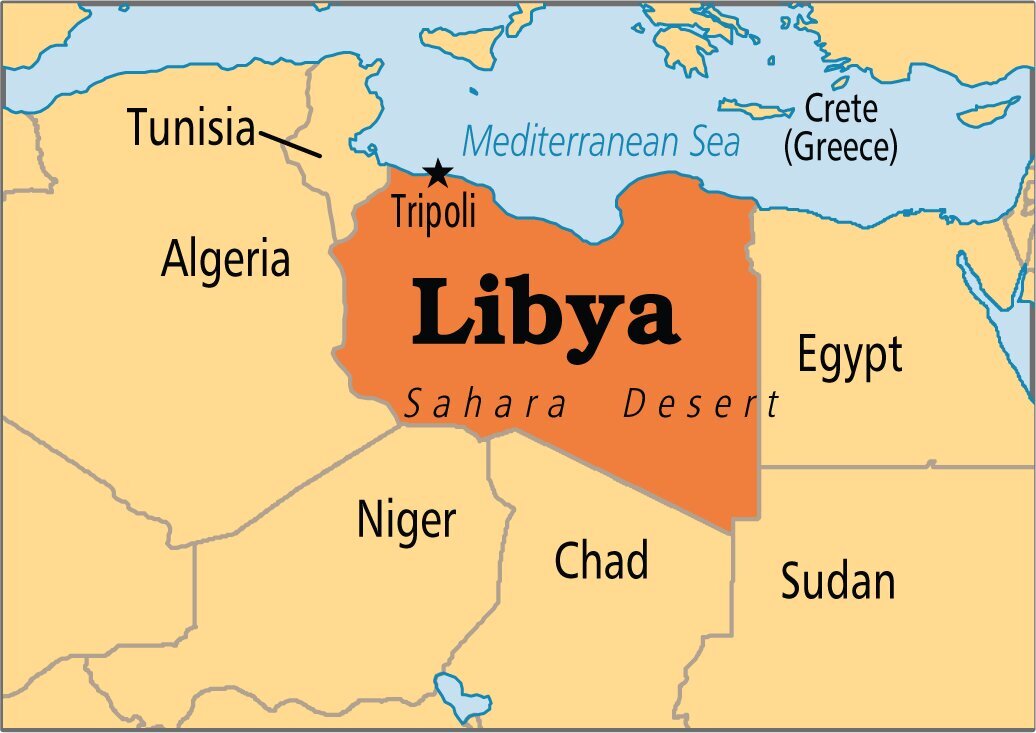International Relations
Conflict in Libya
- 26 Aug 2020
- 8 min read
Why in News
The internal conflict in Libya that has been running since 2011 has shown signs of de-escalation as the rival authorities in the country have called for a ceasefire.
Key Points
- Rival Forces: The Self-proclaimed Libyan National Army (LNA) led by Khalifa Haftar has been battling forces aligned with the Tripoli-based, internationally recognised Government of National Accord (GNA).
- Both sides are formed from local armed factions, whose shifting loyalties have steered the course of the conflict.
- LNA has long enjoyed backing from countries including the United Arab Emirates, Egypt, Russia and Jordan.
- The USA, Turkey and Qatar support the GNA.
- Ceasefire: The ceasefire call by GNA head proposed demilitarising Sirte city and resumption of oil production until a political deal is reached. It has also called for elections in March 2021.
- The LNA dismissed this proposal, but a parallel ceasefire call by the LNA-aligned parliament has proposed Sirte as the seat of a new government.
Background
- Libya was ruled by Muammar Gaddafi for 42 years from 1969 to 2011 after he overturned the previous monarchy and proclaimed the new Libyan Arab Republic.
- In 2011, the first civil war broke out in Libya against the regime of Gaddafi. This war was a part of a series of anti-dictatorial protests in countries of Arab world like Tunisia, Morocco, Iraq, Algeria, Lebanon, Jordan etc, known as the Arab Spring.
- In response to the civil war, a multi-state NATO-led coalition began a military intervention in Libya in March 2011, aimed at protecting civilians and providing cover for a rebel advance.
- The NATO intervention was backed by a UN Security Council resolution 1973 which was supported by 10 countries. 5 countries viz. India, Brazil, Germany, Russia and China abstained from voting.
- A UN-backed internationally recognized government was put in place called the Government of National Accord (GNA) which was supposed to bring out a democratic transition.
- However, GNA failed to provide political stability to the country.
- LNA captured the East of Libya and has been running long campaign against Islamist groups and other opponents since then.
- Libya has no single government currently, with LNA backing the Tobruk-based parliament which governs East of Libya, and the GNA which controls Libya's western parts fromTripoli.
- Both sides have been in constant conflict since 2014, in what has been termed as the second Libyan Civil War. In addition to these, there are also smaller rival groups in the country like the Shura Council of Benghazi Revolutionaries, Islamic State of Iraq and the Levant etc.
Impact
- Nearly 4,00,000 Libyans have been displaced over the past nine years. Thousands more have died.
- The conflict has cost tens of billions of dollars in lost oil revenue, damaged infrastructure, and sharply reduced living standards.
- Covid-19 infections have started to surge.
- The collapse of public services and corruption has fuelled protests in western Libya against the political elite.
- Libya, a member of OPEC, holds Africa’s largest oil reserves, producing 1.6 million barrels per day before 2011. Blockades and presence of military forces have caused output to fluctuate sharply since then, affecting the oil prices.
- International Response:
- The International Berlin conference, held on 19th January 2020, was attended by Libyan parties and other concerned countries.
- As a result of this conference, the UN Security Council endorsed a 55-point road map for ending the war in Libya in February 2020.
- The resolution demands that all countries refrain from interfering in Libya’s conflict and its internal affairs and observe a UN arms embargo, including ceasing all support for and withdrawing all armed mercenary personnel.
- Egypt, in association with LNA, proposed the Cairo Declaration on 6th June, 2020, for the Second Libyan Civil War ceasefire.
- The USA has ordered evacuation of its troops stationed in Tripoli.
- India evacuated its contingent of peacekeeping forces consisting of 15 CRPF personnel from Tripoli. India has also asked its citizens there to exercise extreme caution.
- Foreign powers officially back the process of restoring peace in the country, but have also shipped arms to their allies, undercutting diplomatic efforts.
- The International Berlin conference, held on 19th January 2020, was attended by Libyan parties and other concerned countries.
- India’s Stand:
- India has expressed concern over continuing conflict and instability in Libya and said it supports efforts towards immediate cessation of all hostilities in the country.
- Although India has been critical of the USA military intervention in Libya on the ground that civilians would be affected, its stand on Libya has been more of a realistic one as it has many vested interests in LIbya.
- Economic : The regime in Libya needs to be a friendly one since Libya is an oil rich country and political instability could affect Indian industrial investments and energy security interests there. Indian companies, especially in the hydrocarbon, power, construction and IT sector, have several ongoing projects in Libya.
- Diaspora: Considering an estimated 18,000 Indians who work in Libya, it is a considerable contribution to the remittance economy and adds to India’s foreign exchange
- Foreign Policy: Supporting western intrusion into sovereignty of a country will not set a good precedent for other third-world countries.
Way Forward
- Achieving peace in Libya is crucial not just for the country itself but also for stabilizing the global oil market and set a precedent for other such war-torn countries. However, a lasting deal will require political and economic agreements that have proved elusive for years, and cooperation from foreign powers.
- The western wishful thinking that the exogenous establishment of human rights democracy is possible through expeditionary intervention in domestic affairs of a country needs to end to give way to a more organic building up of trust in democratic institutions and sovereign control.




